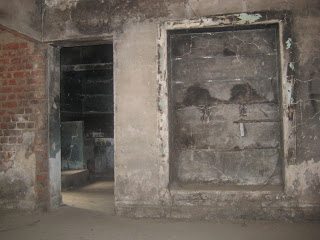









I ask the driver to take me to Naroda Patiya, Naroda Gaun and Gulbaag Colony. The former two are minority Muslim pockets and scars from those couple of days of mayhem are still evident, even after eight years. Drab, dusty and filthy at places, the State has neglected to develop these narrow wandering streets into something even remotely akin to other parts of Ahmedabad or Surat I have seen. What stands out dramatically is the fear on people’s faces, fear of the unknown and the stark possibility of history repeating itself.
It is at Gulbaag Colony that enormity of what transpired hit me quite hard. Just outside the Colony is a hot, busy, bustling street with commerce in full swing. I walk ten steps and stop, as if I have hit a stone wall. The place is deserted, cool and calm and eerie, I gasp; two stray dogs regard me with wary disinterest, then return to napping. The scene is akin to a still from a ghost movie, only here, the presence of lost lives is very real; I involuntarily shiver.
Descriptions from Zakiya Jafri and Firoz Pathan come vividly to mind as I stroll around weed infected lawns and step on piles of rotting leaves. A discarded child’s sandal, a tennis ball, fabric from a torn dress, an empty packet of washing soap, a cricket stump, a laundry clothe line…all reminders of a once normal and dynamic neighborhood. However, what horrifies and depresses me are burnt out rooms of all units I stop at; blackened walls, some with melted clocks, pictures or other artifacts still nailed in, broken, now rotted, half burnt furniture.
I feel I am being watched by the souls of victims that burnt here and shiver again. The driver, feeling similar emotions perhaps, moves away and stands at a distance, conversing with a couple of people. I take few photos fast-fast and join them even faster. These two are vegetable venders who roam around the neighborhood, pushing their wares on a two wheel cart. We chit chat about the events of that day both remember and mourn. One, with a withered face of someone who has been exposed to a lot of sun, speaks freely, expressing similar sentiments I have heard from others. Why the rapes, he asks. Okay, you have an issue with me, take it out on me, hit me, injure me, even kill me. But why rape our women, mothers, wives, daughters? Why, why? The raping of our women in front of our eyes is the most difficult to bear…
My thoughts:
A lot has been said, speculated and written about that fatal incident at Godhra and its aftermath; volumes of pages on the internet and elsewhere. There are some theories that are outright absurd, a few plausible. But when we look at stand alone facts; these glaringly point towards well supported and executed plot against a minority religious population. Consider these facts:
1. Independent forensic evidence point to the fire that begins inside of train, not outside.
2. Bodies of these innocent Hindus slain at Godhra are sent by State authorities to Ahmadabad, some hundred miles away and paraded in front of Hindu mobs to incite revenge.
3. Three radical, extremist and anti-Muslim Hindu groups, the VHP, Baj Rang (youth wing of VHP) and BJP are actively supported by police, encouraging and in some instances actively aiding in the carnage (eye witness accounts as documented by Tehelka, an independent news agency).
4. Arms (knives, swords, fuel, gas cylinders and guns) are quickly assembled and are easily available to anybody who fancies one.
5. A firebrand BJP MLA, Mayaben Kodnani goes riding atop an open Jeep around Ahmadabad all day, urging and inciting Hindu group to take up arms to attack and kill Muslims. The police refuse to arrest her, citing lack of evidence even though another accused testify he was with her all day, inciting others to violence and revenge against Muslims in Naroda Patia and Naroda Gaun.
6. It is only three months after an FIR is registered against the main accused that police make arrests, only for them to easily get bail; these accused are still out and free.
7. Crucial evidence, especially from Naroda Patia and Naroda Gaun is systematically destroyed; the pit where bodies burnt not examined, no forensic samples taken. Dying statements from victims not recorded, postmortem on nearly half the dead not performed (from police records without stating reason of this momentous error); none of the accused is sent in for scientific examinations, no identification of accused by surviving victims done, and many glaring, deliberate destruction of crucial evidence by police and security apparatus as recorded by Tehelka investigators.
8. In spite of so many killings and injuries, in spite of open use of knives, swords, and other armaments, not a single weapon recovered, expect one, a sword.
9. The prime accused, Bajrangi, boasts he is given safe haven at a farm for four months by authorities, then a sympathetic judge grants him bail; he is still out and free.
10. Most damning of all, those in authority visit Naroda Patia and Naroda Gaun twice, once on the day of riots and again next day; garlands rioters and according to the main accused, urges them to do more.
Photographs, in decending order:
1 – 6 Burnt out shells of once vibrant homes.
7 Courtyard of Gulbaag Colony.
8 Home of Zakiya and Ehsaan Jafri.
9 Firoz and Irfaan Phatan.
10 Zakiya Jafri


